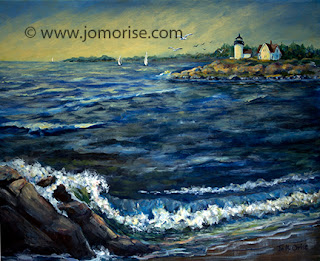Britain’s Got Talent: Shadow Theatre Group Attraction
There is talent is this world. These people worked at their art and look what they've created!
Love it.
Wednesday, May 15, 2013
Thursday, May 9, 2013
I Have Things To Do
| English: Belted Galloway Cattle, Bishopstone. The Belties of Faulston Manor waiting to be taken to there new field. (Photo credit: Wikipedia) |
Hubby and friends repeatedly ask, "Why are you painting cows?" Why not? They are part of the same ecosphere I belong to. The more I look at them, the more I see what they are. I feel a sadness in their limited existence. We know the specter of slaughter looms ahead for the breed. Their eyes divulge innocence and desperation. Is the desperation in my mind? Are they able to decipher the reduction in population in their meadow could mean their time is coming up—never to be seen again? We get around that chilling idea as we focus on the beauty of their pastoral existence whereby observers with a sense of aesthetics stop to take notice or snap a photo.
| Belties Red Glow Artist: Jo M. Orise |
 |
| Curtis Island Light Artist: Jo M. Orise |
Not all creations are masterpieces. Learn your craft and learn to throw away work that doesn't meet your goal as a pretty good piece. Who decides a creation is a masterpiece anyway? Not the artist.
Paint, write, create whatever you wish, but do it with passion, don't be afraid to chuck it and start fresh. Keep learning as you go. Spend hours studying your artwork's progress, reading what you've written. Share with people of similar interests what you've done, listen to their comments. Don't take their critiques as personal indictments of your incompetence. Listen and learn from these comments and thank the person who critiques for having the courage to tell you what she/he thinks.
Decided what you are happy with and then leave it alone. Let time pass then return to your work and decide if it is still good enough. Go on to your next creation and you will see growth and greater understanding of your craft and your ecosphere.
 |
| Picture found at: https://www.facebook.com/photo.php? fbid=553259461381583&set=a.3672496 13315903.85664.354522044588660&type=1&theater |
What do you think.
Post a comment below. Love to hear from you.
Friday, May 3, 2013
My Dad's Fight with Alzheimer's Disease
| Healthy brain (bottom) versus brain of a donor with Alzheimer's disease. Notable is the "shrink" that has occurred in Alzheimer's disease; the brain was decreased in size. (Photo credit: Wikipedia) |
A lot has happened. I was first appointed POA and then Guardian for my father who was an Alzheimer victim. As he progressed in his illness, the dementia made it difficult for us to understand each other. Therefore, I read whatever material and books recommended by his physicians and the state.
Family and not so friendly 'friends' appeared and made things more difficult for no good reason other than not understanding and choosing not to be informed about the disease. They reported, "He's okay. I spoke to him yesterday and he doesn't have Alzheimer's."
I suggested reading material. I explained the progression of the disease. My decisions were interpreted as excuses for me to do whatever I wanted, not what my father wanted.
Over seven years, my father was tested and re-tested for Alzheimer's and each time proved him worse than before. He didn't know what year it was, how old he was, how long he was in one place, how much his rent was. He insisted he needed money daily and called me several times a weeks demanding money be sent to him. He had always been an angry, accusing man. He became more so as the disease progressed. Over the last two years, his confusion and inadequacies brought on by his dementia infuriated him. So, he blamed me. I understood. However, outsiders believed his accusations and encouraged him to fight for his rights. None had the courage to communicate with me at any time. None of them knew I was ensuring his rights. They seemed to thrive in the drama they helped create.
One day he said, "I'm sorry." I replied, "I forgive you, Dad. I'm sorry, too." Dad died two weeks later as I held his hand. No one else was there to challenge the facts. He was finally at peace—so was I.
His picture sits on my desk smiling at me as I work. The family and friends still believe what they want. There is nothing I can do to change the choice to be ignorant of important facts about the disease by these people. However, if ever they are interested, I suggest they read the public documents and affidavits written to the Court. Most importantly, pick up a book on Alzheimer's' and read it to be informed.
Rest in peace, Dad.
Love,
your daughter
| (Photo credit: @Doug88888) |
Subscribe to:
Posts (Atom)